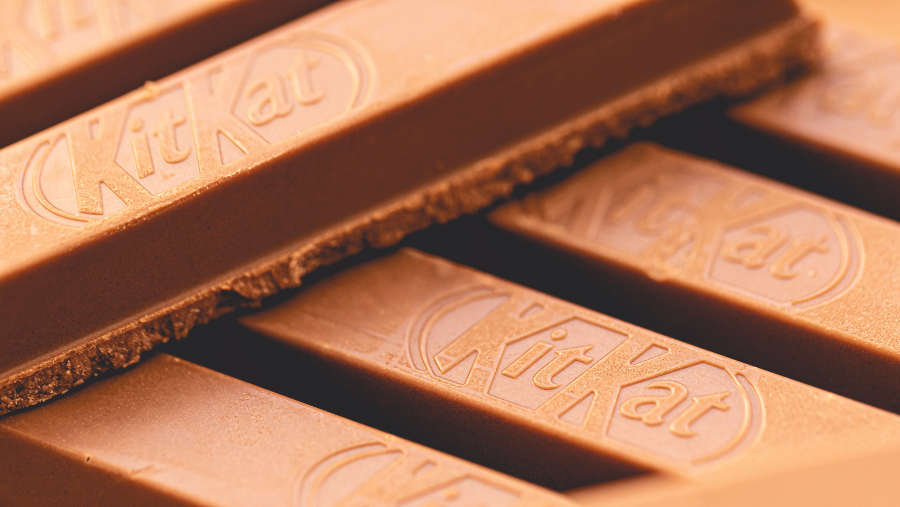
Nestle has launched a range of KitKat chocolate made using cocoa grown by farmers working under its income accelerator initiative.
The product, called KitKat Breaks for Good, is being sold from this month in 27 European countries.

Discover B2B Marketing That Performs
Combine business intelligence and editorial excellence to reach engaged professionals across 36 leading media platforms.
The new KitKat will be distinguished from the original through its packaging, Nestlé told Just Food.
These include a range of four different environmental claims that relate to the outcome of the income accelerator, ranging from “sustainably sourced cocoa” to “more trees planted”.
Nestlé couldn’t confirm the product RRP but said it would not be sold at a premium.
Another KitKat product using cocoa sourced from the accelerator, a limited edition 70% dark chocolate, is also being trialled in the UK this month.

US Tariffs are shifting - will you react or anticipate?
Don’t let policy changes catch you off guard. Stay proactive with real-time data and expert analysis.
By GlobalDataLaunched in 2022, Nestlé’s income accelerator programme aims to “close the living income gap in cocoa-farming families and reduce child labour risk”.
It also looks to improve agricultural practices and “promote gender equality”.
According to the group, the cocoa mass sourced via the accelerator “adheres to one of the highest traceability standards, ensuing ‘mixed identity preserved’ traceability, which allows the company to monitor the journey of its cocoa “from origin to factory”, and store it separately from other sourced cocoa.
Over 10,000 families in Côte d’Ivoire have been supported by the accelerator so far.
The scheme is expected to expand to Ghana this year to include some 30,000 families. Nestlé said it is aiming to support 160,000 cocoa-farming families in total by 2030.
The Swiss giant said it has been working with “various partners and suppliers” to improve its cocoa sourcing worldwide, including food ingredients giant Cargill and the environmental non-profit Rainforest Alliance.
Under its wider Nestlé Cocoa Plan, the company intends to invest SFr1.3bn ($1.bn) between 2022 and 2030 to boost the sustainability of its cocoa sourcing.
The Milkybar maker said it will also work towards using segregated cocoa butter in all KitKat chocolate in Europe “by mid-2024.”
Under the Rainforest Alliance definition, “segregated (SEG) means that the full product content is certified, although it can come from different certified sources/farms, including other countries of origin”.
Nestlé intends to “expand” its adoption of segregated cocoa butter “to other regions in the coming years” but has not disclosed the specific markets.
Michiel van der Bom, Cargill’s product line director for cocoa and chocolate in Europe and west Africa, said: “As a partner on Nestlé’s sustainability journey, we are implementing solutions to source sustainable ingredients for Nestlé in ways that help restore the environment, support families, and increase incomes. Through our partnership, we are building a stronger, more resilient supply chain together.”
Thierry Touchais, manager of strategic accounts at the Rainforest Alliance added: “It’s encouraging to find a company of this scale using a ‘mixed identity preserved’ model in which cocoa can be traced back to Rainforest Alliance certified farmers engaged in Nestlé’s income accelerator. The approach showcases the potential for positive change in the industry.”
Last month, Nestlé was listed alongside Mars and Ferrero as “inadequate” when it came to its cocoa sourcing in a report released by research group Ethical Consumer.
The report found the company was only working with Rainforest Alliance certified cocoa “in the UK in Ireland”, while “worldwide only 50% [is] certified through this”.
Responding at the time through a spokesperson, Nestlé said: “We believe that Ethical Consumer’s assessment of our approach does not reflect the comprehensive detail we provided about our work and therefore does not represent the extent of our efforts to sustainability source cocoa for our products.
“At Nestlé, we have pioneered industry-leading projects and initiatives to further improve the sustainable sourcing of cocoa for our products and to help improve farmers’ livelihoods.”
Ethical Consumer said that major chocolate brands were still “dragging their feet” when it came to improving cocoa farmer living conditions.
The group gave an “adequate” label to producers which had 100% of the ingredient certified by Fairtrade or the Rainforest Alliance and offered a premium payment rate to farmers.
Those brands included Moo Free, Tony’s Chocolonely and ’57 Chocolate.





